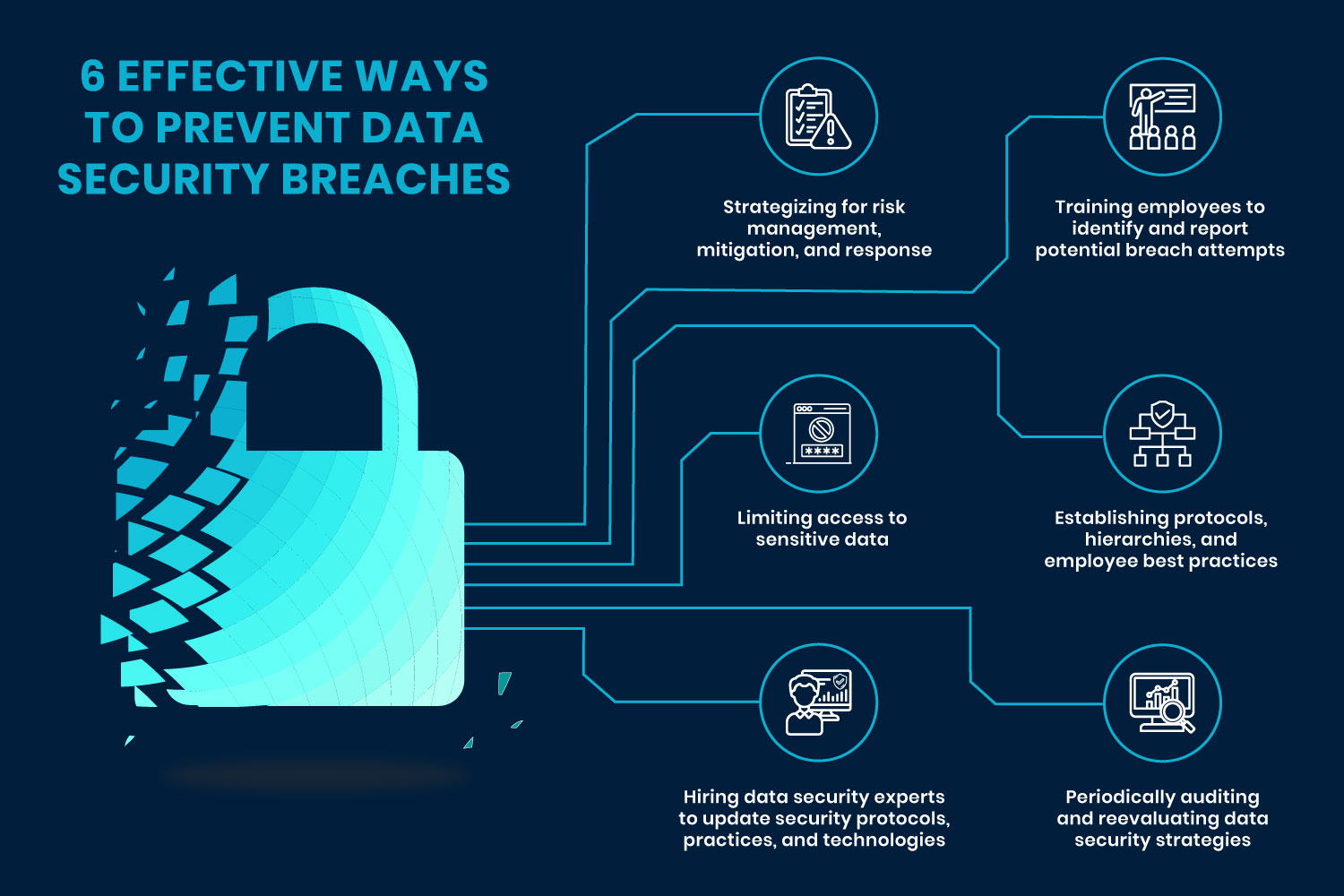A data breach occurs when confidential information is intentionally or unintentionally exposed to unauthorized parties. Data has become one of the most critical components in the digital era, and data leakage poses significant risks to organizations, including substantial monetary and reputational losses.

Despite the focused efforts to ensure data security, new instances of security data breaches surface every day. Data loss detection and prevention has emerged as a business's most pressing security concern.
Some of the most common methods for data breaches include malware, ransomware, viruses, and phishing attacks. All it takes for cybercriminals to gain access to business-sensitive data is a single click on a malicious link.
Data Breaches: Threats and Consequences
Threats of data breaches don't always come from cyber criminals. Employees, consultants, and suppliers may also threaten data security.
Cybercriminals may use malicious websites or infected emails to gain access to your networks via malware. And with data being accessible from mobile accounts and cloud applications, traditional security measures, like firewalls, are no longer enough to protect your data.
In the short term, you may face direct fines and fees because of the high regulatory burden. You may also be required to pay for an investigation to identify the source of the data breach and future remediation costs. In the long run, customers will lose trust in your business, and you will lose your reputation as you fail to protect customers' sensitive information.
And as past examples have shown, this results in a decline in stock value and sales growth. For example, after a data breach, publicly traded firms experienced an average stock value drop of 7.5%, along with an average market capitalization loss of $5.4 billion.
Business Uncertainty in the Face of a Data Breach
Cyberattacks and data breaches have the potential to spread false information or misuse business-critical information. With many businesses experiencing multiple data breach attacks, they must choose between assessing the risk and investing in more stringent security protocols or increasing prices and making customers bear the cost of the data breach investigations.
A study revealed that 83% of businesses experience multiple data security breach attacks, and 60% have increased prices post-data breach to pass the costs onto customers. Organizations must assess, plan for, and mitigate data breach risk as any other operational risk and not let cyberattacks create an environment of business uncertainty.
Effective Ways to Prevent Data Security Breaches
 No set of security measures is entirely impervious to a breach, as seen by recent security breaches of several significant, tech-savvy businesses, including Target, LivingSocial, Facebook, Gmail, and Twitter. Therefore, the next thing that organizations must consider is their plan of action in the case of a data breach.
No set of security measures is entirely impervious to a breach, as seen by recent security breaches of several significant, tech-savvy businesses, including Target, LivingSocial, Facebook, Gmail, and Twitter. Therefore, the next thing that organizations must consider is their plan of action in the case of a data breach.
In today's digital business ecosystem, while you cannot avoid data security breach attempts, you can take proactive steps to reduce the risk of cyber security breaches by:
-
- Treating the risk of security breaches like any other business risk and strategizing for risk management, mitigation, and response.
- Training your employees and raising awareness about common data breach attacks so employees can identify and report potential breach attempts.
- Establishing protocols, hierarchies, and employee best practices to eliminate human error as a potential source of a data breach.
- Limiting access to your most sensitive data.
- Hiring data security experts to improve and continually update security protocols, practices, and technologies, like traffic monitoring, VPNs, security AI, and automation.
- Periodically auditing and reevaluating your data security strategy to account for emerging threats, eliminate obsolete security practices, and keep protecting your business from data breach risks.
Legal and Regulatory Implications of Data Breaches
Data breaches are not only a technical issue but also a significant legal and regulatory concern. Regulations like the GDPR and CCPA impose strict requirements on how businesses handle and report personal data, with severe penalties for non-compliance, such as fines up to €20 million or 4% of global revenue. Industry-specific regulations, like HIPAA for healthcare or PCI DSS for payment data, add additional layers of compliance. Businesses must proactively implement comprehensive data protection policies, conduct regular audits, and stay updated on regulatory changes to avoid legal repercussions and maintain trust with stakeholders.
Risk Assessment and Management Strategies
Effective data protection begins with a thorough risk assessment to identify vulnerabilities and potential threats. Utilizing frameworks like NIST or ISO/IEC 27001, businesses can prioritize security measures such as encryption and multi-factor authentication. Continuous monitoring and regular updates to security protocols are essential to mitigate risks. Additionally, an incident response plan ensures quick action in the event of a breach, minimizing potential damage and operational disruptions.
Effective Ways to Prevent Data Security Breaches
Preventing data breaches requires robust access controls, such as multi-factor authentication, which can block 99.9% of automated attacks. Regular security training for employees is crucial, as human error often leads to breaches. Investing in advanced technologies like intrusion detection systems and data loss prevention tools further strengthens an organization's defense against cyber threats, ensuring long-term data security and business stability.
How Can Knowledge Ridge Help?
At Knowledge Ridge, we have access to experts with specialized industry know-how to help you navigate the constantly evolving digital business ecosystem.
Our subject matter experts are knowledgeable about the latest data security policies and protocols and the most current technological tools. They can help organizations strategize and prepare for and prevent potential data security breach attacks.
Many small businesses may not have the technology and resources to accomplish this in-house, and Knowledge Ridge can help. With our extensive network of 353,000+ experts across 80+ countries, our custom-vetted experts can help you:
-
- Train employees on data security best practices
- Strategize for cyber security breach risk management, mitigation, and response
- Set up and implement stringent data security protocols
- Audit data security strategy to identify and address network weaknesses
Get in touch with us to safeguard your business from potential data breaches and consequent business instability.
Secure Your Business Against Potential Data Breaches and the Subsequent Risk of Business Disruption.
Frequently Asked Questions
What are three implications that occur as a result of a data breach?
Because of a data breach, organizations:
-
- Are levied fines that affect the company's bottom line in the short term
- Lose their hard-earned reputation and customers' trust
- Losing its customer base affects the company’s long-term sales growth and stock value
How do data breaches affect the economy?
Businesses lose millions of dollars as a result of data breaches. And if these security concerns increase the cost to businesses, the prices for goods and services would also increase, creating a state of economic instability and business uncertainty.

